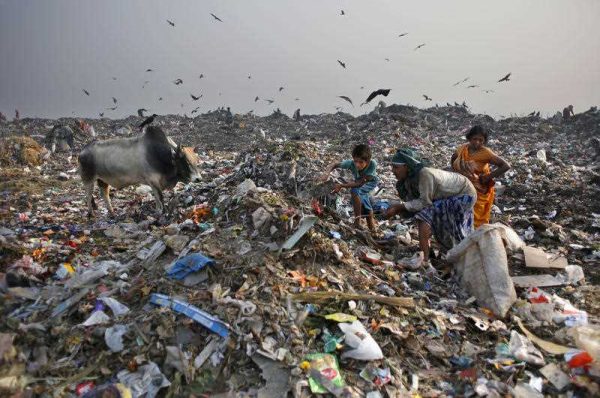Due to sustained rapid economic growth, Indian cities are expected to only intensify their consumption patterns. However, India’s per capita waste generation is significantly lower compared to that of developed world.
Traditionally, less economically developed countries suffer from poor-quality waste management services due to their lack of infrastructure. But their waste generation rates are usually low and hence issues related to scale do not tend to arise. On the other hand, richer economies enjoy very efficient waste management services owing to their superior infrastructure and community awareness of sustainability issues. But they grapple with issues of scale including problems such as scarcity of land for disposal and disposal technologies.
India suffers from both inefficient waste infrastructure and increasing rates of solid waste generation per capita, due in part to the country’s service sector driven economic growth. This presents a case where both issues of service quality and waste quantity need to be handled together. This is a unique situation that developing Asian countries like India are being confronted with and as such its solutions must also be unique.
The management of solid waste through collection, processing, transportation and disposal in India is the responsibility of urban local bodies (ULBs). ULBs are responsible for segregated waste collection, transporting waste in covered vehicles, processing recyclables, separating domestic hazardous waste and disposing inert material in sanitary landfills. But most ULBs in India struggle to provide efficient waste management services due to financial problems, lack of infrastructure and technology, and a lack of involvement from the private sector and non-governmental organisations.
Unlike many other countries in the region, Indian cities do not charge for waste collection and management, making it a financial burden for ULBs, while also leading to poor community participation in sustainability initiatives. This results in inefficiencies such as unsegregated waste collection and low territorial coverage, as well as other issues health concerns including the collection and transportation of waste in open trucks, limited waste recovery and processing, and indiscriminate dumping at open dump sites without leachate treatment. These issues result in serious health damage and economic losses. The waste management sector in India is further supplemented by informal workers who come from the urban poor. These so-called rag pickers, who are instrumental in waste recycling, are highly vulnerable to health damages owing to shabby work conditions.
Over the last decade, the Indian government has taken up a number of initiatives to augment the country’s waste management infrastructure. Under the Jawaharlal Nehru Urban Renewal Mission, the government of India funded 49 solid waste management projects in various cities between 2006 and 2009. Solid waste management was made a priority in the National Mission on Sustainable Habitat, which is a part of India’s National Action Plan for Climate Change. At present, the Modi government has been implementing Swachh Bharat Abhiyan, a cleanliness campaign emphasising waste management at different stages of generation, collection and disposal.
Another national level initiative aimed at improved waste management is the Smart Cities mission under which 100 cities will be provided with significant funding to improve civic services infrastructure. In smaller cities, the Modi government has started a partner scheme, the Atal Mission for Rejuvenation and Urban Transformation, aimed at improving urban infrastructure. State governments also provide financial support to ULBs to improve their waste management systems under various schemes and programs. As a result of these initiatives, many Indian cities have taken steps towards implementing good solid waste management practices aimed at community-based waste segregation and collection, public–private partnerships and investments in modern technology.
Solid waste management problems and response strategies are distinct for developing and developed countries. While developing countries aim primarily to improve the systemic efficiency of waste management services, as well as community participation in waste disposal, developed countries aim to control waste generation and find means to achieve maximum rates of recycling. To achieve their distinct objectives, developing countries attempt measures such as awareness raising campaigns, improvements of infrastructure and systemic efficiency, and funding augmentation. In contrast, developed countries invest in technology for better waste recycling and disposal, while applying economic instruments such as material levies, product charges and waste collection charges to achieve waste reduction and recycling.
As developing Asian countries like India and China are confronted simultaneously with issues of service quality and waste quantity, an integrated approach to waste management is essential. While the Indian government’s current initiatives are focused on infrastructure development, Indian cities should aim to avoid future problems by addressing pertinent issues like systemic inefficiency, community participation in waste segregation, waste reduction and recycling. India should also work towards addressing the role of the informal sector in solid waste management, and introducing economic instruments in waste management. Waste management is not only essential from a public welfare perspective but can also contribute to developing countries’ economic growth if the recycling industry is promoted alongside eco-industrial production. Such an integrated approach would put India at an advantage while managing its growing solid wastes.
Sudhakar Yedla is a professor at the Indira Gandhi Institute of Development Research.

